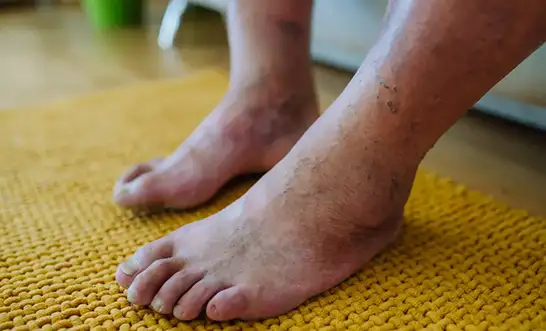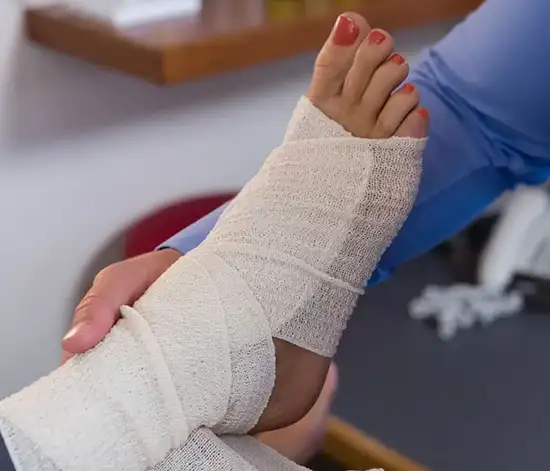Diabetic Foot Care For Total Healing and Relief
Diabetes can bring unique challenges, especially when it comes to your foot health. Complications like diabetic foot pain, ulcerated sores on the feet, and poor healing can make simple activities excruciating and increase the risk of serious issues. Our podiatry specialists can help you effectively prevent, treat, and manage diabetic foot issues so you can enjoy the life you love.
Diabetic Foot Care For Total Healing and Relief

- Advanced Treatment Options
- Patient-Centric Approach
- Comprehensive Care Network
Diabetes and the Importance of Diabetic Foot Care

Diabetes and the Importance of Diabetic Foot Care
Our Patient-Centered Approach to Diabetic Foot Care
- Comprehensive foot examination
- Wound care for diabetic foot ulcers
- Circulation and nerve function testing
- Custom orthotics and protective footwear
- Education on proper foot care
This comprehensive approach enables us to treat existing diabetic foot symptoms while preventing further complications, helping you maintain optimal foot health. We’re committed to making your treatment as supportive and effective as possible, prioritizing your comfort and overall health every step of the way.
Here’s What Patients Are Saying About Our Care



4.89 Average Online Review Score



Common Causes of Diabetic Foot Pain, Ulcers, and Blisters
Foot problems in individuals with diabetes often stem from two main issues: nerve damage (neuropathy) and reduced blood flow. Neuropathy, a common complication of diabetes, affects the ability to feel sensations like heat, cold, or pain in the feet. This lack of sensation makes it challenging to notice injuries, which can develop into serious infections if left untreated.
Reduced blood flow, another result of diabetes, also contributes to diabetic foot problems. Without proper blood circulation, the body has a hard time healing wounds, and infections can spread more easily. Combined, these factors make conditions like diabetic foot ulcers, blisters, and sores on the feet more likely, requiring proactive and specialized care like the kind we offer at StrideCare.
Signs and Symptoms of a Diabetic Foot Condition
When you have diabetes, even small issues can quickly turn into serious complications. Early identification of diabetic foot symptoms can make all the difference in preventing infections, avoiding long-term damage, and maintaining your mobility. If you notice any of the following symptoms, seeking diabetic foot care right away is crucial:
- Swelling or redness around the feet and ankles
- Blisters, sores, or ulcers that don’t heal properly
- Numbness or tingling in the feet and toes
- Persistent foot pain or discomfort
- Changes in skin color or temperature
At StrideCare, we’re here to help you stay on top of your foot health. Our skilled team of specialists is experienced in managing diabetic foot conditions and provides the compassionate, expert care needed to protect your feet and avoid complications from diabetes.
Get Expert Diabetic Foot Care Near You
Are you struggling with diabetic foot ulcers or other painful foot conditions related to diabetes?
Enter your zip code below to find a StrideCare specialist near you and get help today.
Frequently Asked Questions About Diabetic Foot Care
Why does diabetes affect the feet?
People with diabetes are at a higher risk of foot problems due to nerve damage and reduced blood flow. Proper foot care can help prevent serious complications, including infections and the risk of amputation.
What diabetic foot symptoms should I watch out for?
Symptoms like swelling, redness, numbness, blisters, sores, and changes in skin color or temperature can all indicate foot problems that need prompt medical attention to prevent worsening.
How can I prevent diabetic foot ulcers?
When should I see a specialist for diabetic foot pain?
If you’re experiencing persistent foot pain, numbness, or sores that don’t heal, it’s a good time to see a specialist. Early intervention can help prevent further complications and support faster recovery.


